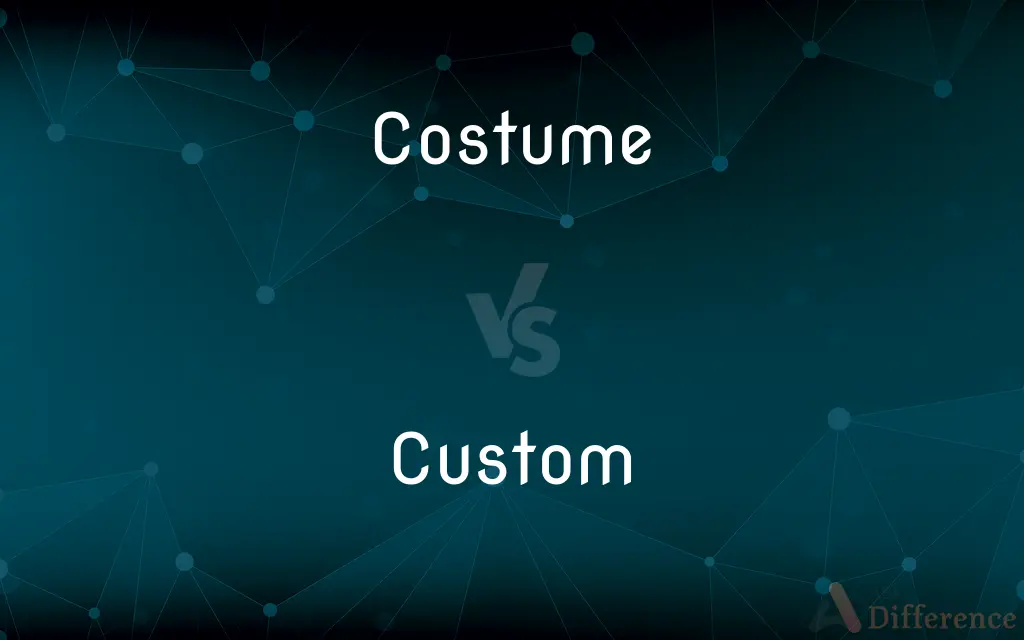Costume vs. Custom — What's the Difference?
By Tayyaba Rehman & Fiza Rafique — Updated on March 29, 2024
Costume refers to a set of clothes worn by someone to look like someone else or from another era, while custom represents a traditional practice or a usual way of behaving.

Difference Between Costume and Custom
Table of Contents
ADVERTISEMENT
Key Differences
A costume is essentially a set of clothes, often designed for specific occasions such as Halloween or theatrical performances, aiming to transform an individual's appearance to represent a character, era, or concept. On the other hand, custom pertains to behaviors, practices, or traditions that are passed down through generations, showcasing the way of life, beliefs, or social norms within a particular community or culture.
Costumes are often characterized by their temporary nature, being adopted for specific events or performances and not used in everyday life. Whereas customs are ingrained in the daily lives of people, reflecting their cultural identity and continuity over time.
While costumes can be a means of expressing individual creativity or artistic talent through design and fabrication, customs serve as a means of social cohesion, embedding values, and norms within a community, thus differentiating cultures and societies.
The choice of a costume can be highly personal, influenced by individual tastes, interests, or the requirements of a particular event. In contrast, customs are collectively observed, often without the need for personal choice, as they are seen as a given within a society or culture.
Costumes have a broad scope, covering not only clothing but also accessories and makeup to complete a transformation. Custom, however, encompasses a wider range of practices including rituals, celebrations, and social conduct, beyond just physical appearance.
ADVERTISEMENT
Comparison Chart
Definition
A set of clothes designed for specific occasions.
A traditional practice or habitual behavior.
Purpose
To transform appearance for entertainment or celebration.
To uphold cultural or societal norms.
Temporality
Temporary and event-specific.
Ongoing and integrated into daily life.
Scope
Primarily involves clothing, accessories, and makeup.
Encompasses behaviors, rituals, and practices.
Influence
Driven by individual choice or event requirements.
Dictated by cultural or societal expectations.
Compare with Definitions
Costume
A costume can be a historical outfit worn to reenact a particular era.
Dressing as a 1920s flapper for a theme party.
Custom
A custom can be a social habit. like greeting others with a handshake in many cultures.
Shaking hands when meeting someone new.
Costume
It can represent a character from a movie.
Wearing a Superman costume for Halloween.
Custom
It might involve holiday traditions.
Decorating a Christmas tree every December.
Costume
Professional performers often wear costumes as part of their roles.
A ballerina wearing a tutu for a performance.
Custom
Customs can include societal norms.
Wearing formal attire to a wedding.
Costume
Costumes may also include accessories to complete a look.
A pirate's hat and sword for a pirate outfit.
Custom
Rituals such as tea ceremonies in Japan highlight the importance of customs in cultural identity.
Participating in a traditional tea ceremony.
Costume
Some costumes are used for cultural or religious celebrations.
Wearing traditional garments for a cultural festival.
Custom
In some cultures. there are customs for mourning.
Wearing black clothes during a period of bereavement.
Costume
Costume is the distinctive style of dress or cosmetic of an individual or group that reflects class, gender, profession, ethnicity, nationality, activity or epoch. In short costume is a cultural visual of the people.
Custom
A traditional and widely accepted way of behaving or doing something that is specific to a particular society, place, or time
Custom demanded that a person should have gifts for the child
The old English custom of dancing round the maypole
Costume
A style of dress, including garments, accessories, and hairstyle, especially as characteristic of a particular country, period, or people.
Custom
Regular dealings with a shop or business by customers
If you keep me waiting, I will take my custom elsewhere
Costume
An outfit or a disguise worn on Mardi Gras, Halloween, or similar occasions.
Custom
Made or done to order; custom-made
A custom guitar
Costume
A set of clothes appropriate for a particular occasion or season.
Custom
A traditional practice or usual way of doing something followed by a social group or people.
Costume
To put a costume on; dress.
Custom
The tradition or body of such practices
The respect that is by custom accorded to the king.
Costume
To design or furnish costumes for.
Custom
A habitual practice of a person
My custom of reading a little before sleep.
Costume
A style of dress, including garments, accessories and hairstyle, especially as characteristic of a particular country, period or people.
Custom
Habitual manner or practice
I am not by custom a coffee drinker.
Costume
An outfit or a disguise worn as fancy dress etc.
We wore gorilla costumes to the party.
Custom
(Law) A common tradition or usage so long established that it has the force or validity of law.
Costume
A set of clothes appropriate for a particular occasion or season.
The bride wore a grey going-away costume.
Custom
Habitual patronage, as of a store
Tried to obtain the custom of the wealthiest shoppers.
Costume
To dress or adorn with a costume or appropriate garb.
Custom
Duties or taxes imposed on imported and, less commonly, exported goods.
Costume
Dress in general; esp., the distinctive style of dress of a people, class, or period.
Custom
(used with a sing. verb) The governmental agency authorized to collect these duties.
Costume
Such an arrangement of accessories, as in a picture, statue, poem, or play, as is appropriate to the time, place, or other circumstances represented or described.
I began last night to read Walter Scott's Lay of the Last Minstrel . . . .I was extremely delighted with the poetical beauty of some parts . . . .The costume, too, is admirable.
Custom
(used with a sing. verb) The place where goods and baggage entering a country are inspected by this agency
Go through customs.
Costume
A character dress, used at fancy balls or for dramatic purposes.
Custom
Tribute, service, or rent paid by a feudal tenant to a lord.
Costume
The attire worn in a play or at a fancy dress ball;
He won the prize for best costume
Custom
Made to order
Custom suits.
Costume
Unusual or period attire not characteristic of or appropriate to the time and place;
In spite of the heat he insisted on his woolen costume
Custom
Specializing in the making or selling of made-to-order goods
A custom tailor.
Costume
The prevalent fashion of dress (including accessories and hair style as well as garments)
Custom
Frequent repetition of the same behavior; way of behavior common to many; ordinary manner; habitual practice; method of doing, living or behaving.
Costume
The attire characteristic of a country or a time or a social class;
He wore his national costume
Custom
Habitual buying of goods from one same vendor.
Costume
Dress in a costume;
We dressed up for Halloween as pumpkins
Custom
(collectively) The habitual patrons (i.e. customers) of a business; business support.
Costume
Furnish with costumes; as for a film or play
Custom
(legal) Long-established practice, considered as unwritten law, and resting for authority on long consent. Compare prescription.
Custom
Traditional beliefs or rituals.
The Ancient Egyptian culture had many distinctive and interesting beliefs and customs; one custom was the mummification of the dead.
Custom
A custom (made-to-order) piece of art, pornography, etc.
Custom
(obsolete) Familiar acquaintance; familiarity.
Custom
Toll, tax, or tribute.
Custom
Created under particular specifications, specially to fit one's needs: specialized, unique, custom-made.
My feet are very large, so I need custom shoes.
Custom
Own, personal, not standard or premade.
We can embroider a wide range of ready designs or a custom logo.
Custom
(archaic) Accustomed; usual.
Custom
To make familiar; to accustom.
Custom
To supply with customers.
Custom
To pay the customs of.
Custom
To have a custom.
Custom
Frequent repetition of the same act; way of acting common to many; ordinary manner; habitual practice; usage; method of doing or living.
And teach customs which are not lawful.
Moved beyond his custom, Gama said.
A customMore honored in the breach than the observance.
Custom
Habitual buying of goods; practice of frequenting, as a shop, manufactory, etc., for making purchases or giving orders; business support.
Let him have your custom, but not your votes.
Custom
Long-established practice, considered as unwritten law, and resting for authority on long consent; usage. See Usage, and Prescription.
Custom
Familiar aquaintance; familiarity.
Age can not wither her, nor custom staleHer infinite variety.
Custom
The customary toll, tax, or tribute.
Render, therefore, to all their dues: tribute to whom tribute is due; custom to whom custom.
Custom
Duties or tolls imposed by law on commodities, imported or exported.
Custom
To make familiar; to accustom.
Custom
To supply with customers.
Custom
To have a custom.
On a bridge he custometh to fight.
Custom
To pay the customs of.
Custom
Accepted or habitual practice
Custom
A specific practice of long standing
Custom
Money collected under a tariff
Custom
Habitual patronage;
I have given this tailor my custom for many years
Custom
Made according to the specifications of an individual
Common Curiosities
Can customs change over time?
Yes, customs can evolve or change as societies change, though some customs may remain relatively stable over long periods.
How do costumes contribute to cultural events?
Costumes can enhance the authenticity and atmosphere of cultural events, allowing participants to visually connect with the culture being celebrated.
Are there any occasions where costumes and customs overlap?
Yes, during cultural festivals or religious ceremonies, where traditional attire (costumes) is worn as part of the customs.
What is the main difference between a costume and a custom?
A costume is a set of clothes for specific occasions, while a custom is a traditional or habitual practice.
Can costumes reflect cultural customs?
Yes, costumes can reflect cultural customs, especially when they are used in traditional celebrations or ceremonies.
How do individuals choose costumes?
Individuals choose costumes based on personal interests, the nature of the event, or cultural significance.
What role do customs play in society?
Customs play a crucial role in defining the identity, cohesion, and continuity of a society or cultural group.
Can wearing a specific costume be considered offensive?
Yes, wearing costumes that stereotype or appropriate cultural symbols without understanding their significance can be considered offensive.
Are customs always related to cultural or religious practices?
While many customs are rooted in cultural or religious traditions, some customs may simply be societal norms or practices without religious significance.
Is it necessary to understand the customs of a culture before participating in its events?
Understanding customs is important to participate respectfully and appropriately in cultural events.
Why are customs important to cultural heritage?
Customs are vital as they preserve historical practices and values, contributing to a society's unique cultural heritage.
Do customs vary significantly across different cultures?
Yes, customs can vary widely across cultures, reflecting the unique values, beliefs, and histories of each society.
What impact does globalization have on customs?
Globalization can lead to the blending of customs, but it may also threaten the preservation of traditional practices.
Are there ethical considerations in choosing costumes for events?
Ethical considerations include cultural sensitivity, avoiding stereotypes, and respecting the origins and meanings of the costume chosen.
How can costumes affect the portrayal of characters in media?
Costumes are key in visual storytelling, helping to define characters' identities, backgrounds, and periods in which the story is set.
Share Your Discovery

Previous Comparison
Pride vs. Arrogance
Next Comparison
Antidiagonal vs. DiagonalAuthor Spotlight
Written by
Tayyaba RehmanTayyaba Rehman is a distinguished writer, currently serving as a primary contributor to askdifference.com. As a researcher in semantics and etymology, Tayyaba's passion for the complexity of languages and their distinctions has found a perfect home on the platform. Tayyaba delves into the intricacies of language, distinguishing between commonly confused words and phrases, thereby providing clarity for readers worldwide.
Co-written by
Fiza RafiqueFiza Rafique is a skilled content writer at AskDifference.com, where she meticulously refines and enhances written pieces. Drawing from her vast editorial expertise, Fiza ensures clarity, accuracy, and precision in every article. Passionate about language, she continually seeks to elevate the quality of content for readers worldwide.
















































